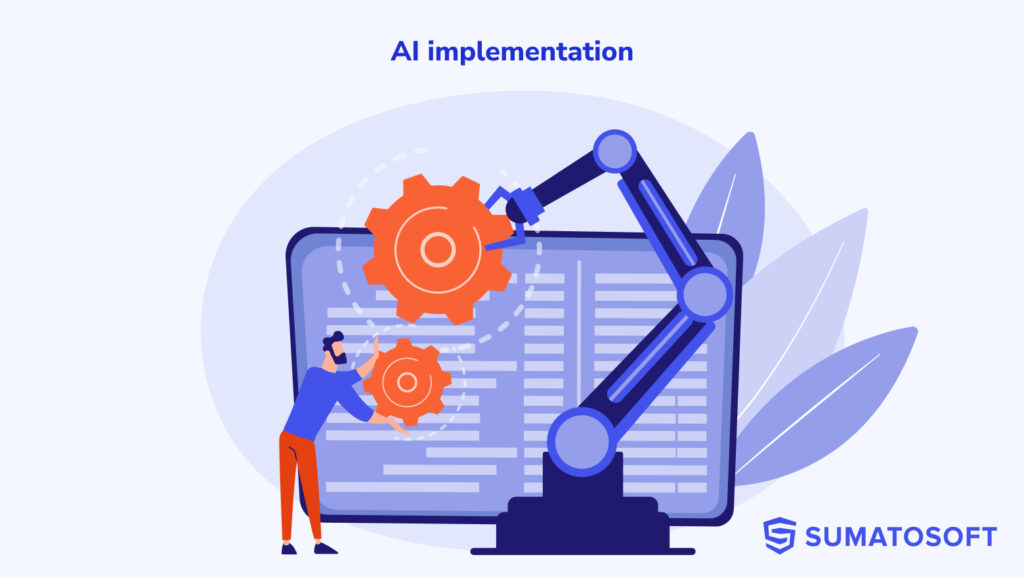eCommerce web development services
Adhering to the latest US market trends in eCommerce software development, we provide an exceptional shopping experience tailored to the unique preferences of American consumers.
We use brand-new ways to optimize customer services and order processes with our eCommerce website development services.
Grow your eCommerce business with SumatoSoft’s services
eCommerce custom development from scratch
We guide US businesses through the entire journey of planning, designing, developing, and launching their eCommerce website, focusing on the specific needs and regulations of the US market.
Audit of an existing eCommerce solution
We thoroughly examine your eCommerce website, its code, architecture, security and access control aspect, performance issues, and usability. Then we write up a report with recommended solutions to every issue.
Mobile app design and development services
We develop bug-free iOS, Android, and cross-platform eCommerce applications. These eCommerce development services help you to engage your customers even when they are on the go.
eCommerce migration
This service includes migration from eCommerce platforms that slow down your business growth. Our design and development team finds an appropriate eCommerce solution or designs a custom one, configures it, and safely transfers all business processes, data, and analytics.
eCommerce integration
We use APIs to enable automatic data and digital document transfer between an eCommerce website and your departments: accounting, inventory, sales, CRM, and marketing.
Post-release support services
Within long-lasting eCommerce support services, our team tunes out the eCommerce website, ensures it’s online and available, handles updates management, updates connected libraries and frameworks, and monitors and optimizes the performance of your eCommerce website.
Types of eCommerce solutions you might look for
Microservice-based eCommerce
We design eCommerce systems that allow easy communication orchestration between small independent eCommerce microservers. Benefit from improved scalability, fault tolerance, increased flexibility, and faster development with SumatoSoft’s microservice-based architecture!
Digital marketplace
Reach a large customer base without investing in building and maintaining your digital eCommerce infrastructure. Provide a one-stop digital shop for a wide range of products and allow third-party retailers to sell their products or services to a shared customer base.
Multistore eCommerce
Multistore eCommerce websites enable multiple store management from a single system. Multistore eCommerce is an ideal type of software if you plan to sell your products through multiple channels, like your website, social media platform, marketplaces, and physical stores. Reach a wider audience, expand territorially, and increase sales of your products with a multistore eCommerce website!
Progressive web applications
Want to have more control over the look and feel of your eCommerce website? We create unique template-free web designs for headless solutions. Get custom storefronts powered by the blazing-fast performance of a headless eCommerce.
Web design for headless eCommerce
Want to have more control over the look and feel of your eCommerce website? We create unique template-free web designs for headless solutions. Get custom storefronts powered by the blazing-fast performance of a headless eCommerce.
eCommerce dropshipping
With drop shipping eCommerce websites, you can offer a wide range of products without investing in inventory or storage space. Act as a liaison between the customer and suppliers and focus on marketing and sales while the supplier handles the fulfillment and logistics management! Our appealing Eommerce website design facilitates customer attraction and retention.
B2B eCommerce
Are you a manufacturer? Maybe you offer raw materials, supplies, or other products and services that help businesses run their operations online. We build full-fledged B2B eCommerce websites that feature advanced payment and financial options, digital personal accounts, revenue management, integration with CRM or supply chain management systems, support for complex pricing and contract agreements, and more digital features.
B2C eCommerce
Whether you are a retail store, marketplace, or another website where consumers can purchase products or services both online and offline, we can ramp up your online eCommerce presence to a new level. We build well-designed eCommerce websites with easy navigation and checkouts, and clear interfaces. We design and develop convenient support systems that provide an excellent customer experience online. We follow market trends to help you stay competitive. Apply now!
Why choose SumatoSoft for eCommerce website development service
- 98% of our Clients are satisfied with the eCommerce software development services we provide.
- 150 successful projects in 27 countries for 11 business domains.
- 60 specialists on board, 10 years on the market of eCommerce software development services.
- No communication barrier since all specialists speak English well.
- Our expertise in eCommerce development is particularly honed for the US market, ensuring that our solutions resonate with American consumers.
- We design top-notch eCommerce websites and know how to increase the conversion rate from 0.1% to 1.6%, increase traffic growth by 15% every month, boost referral traffic by 340%, and increase organic traffic by 186%.

Recent software we made
Online advertising management platform
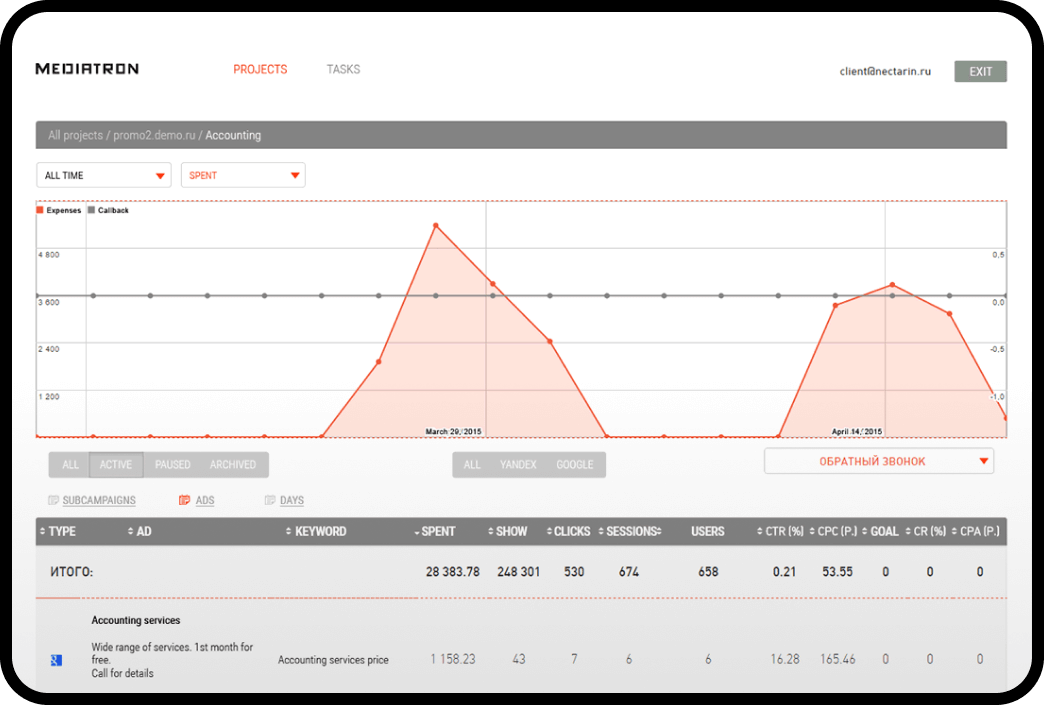

Intelligent marketing tracking tool modernization
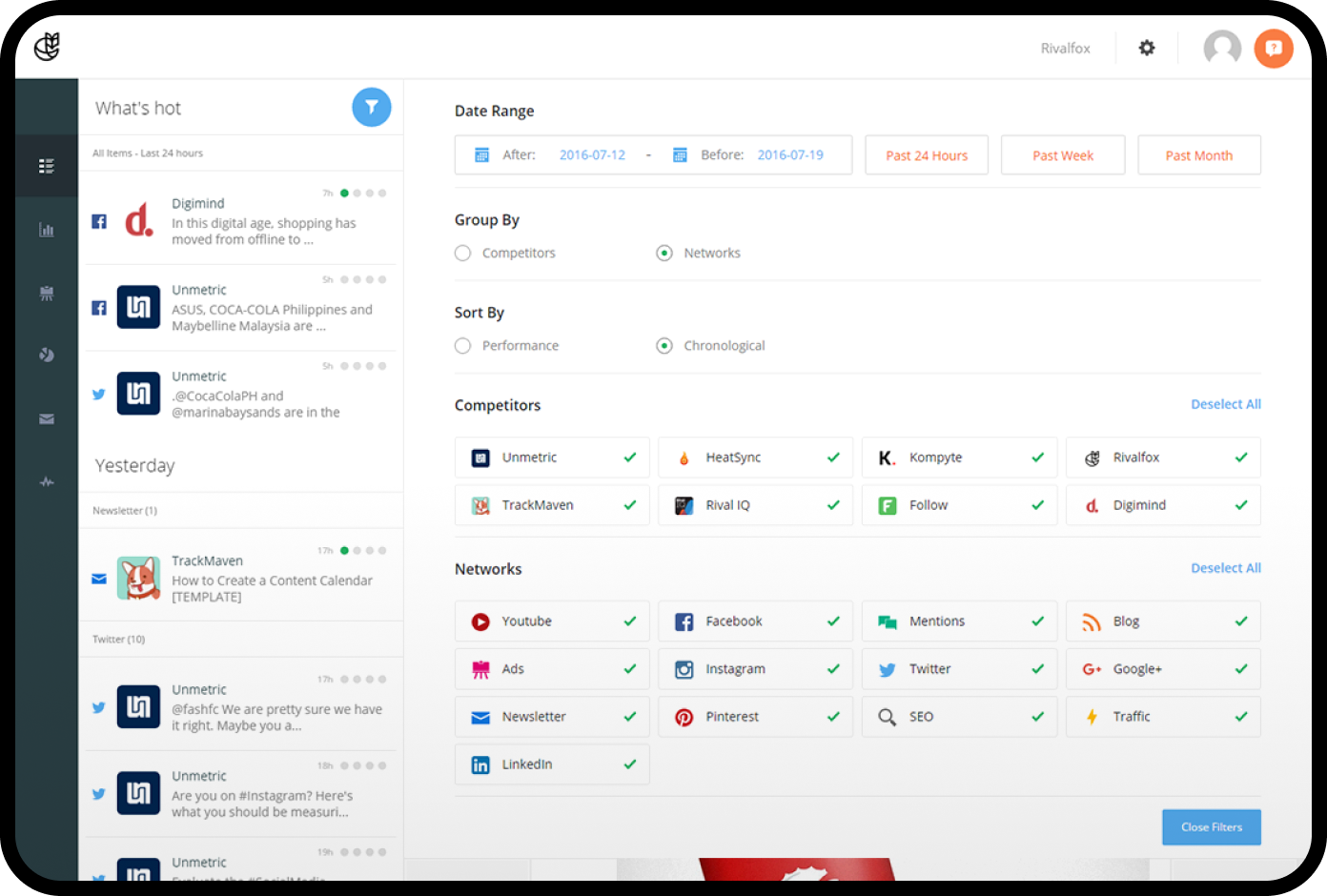

Web aggregator of local heating oil prices
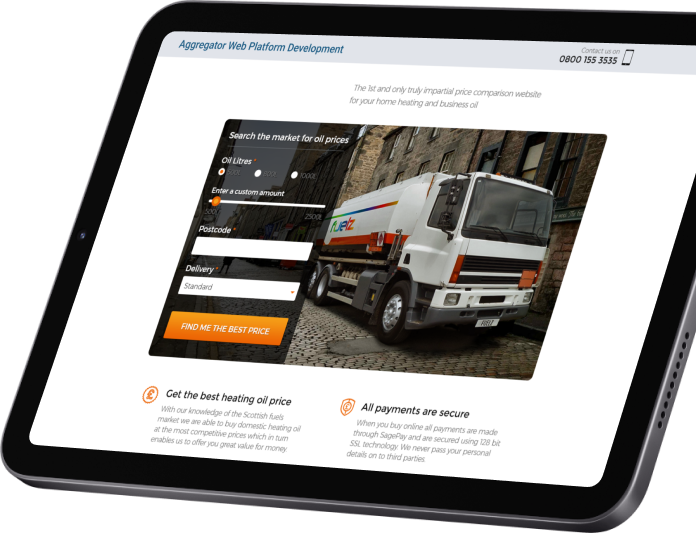
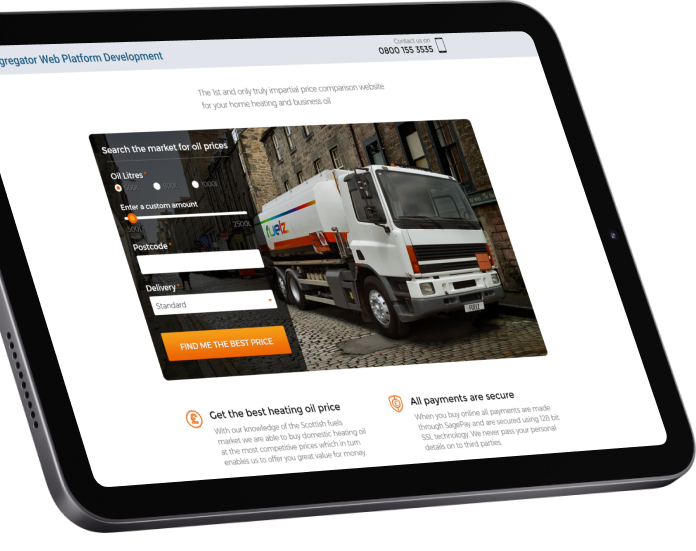
Team roles in eCommerce website design and development
Depending on the size of the eCommerce development team, there may be 10 roles. In general, the goal is to have a diverse design and development team with a range of skills and expertise so that all aspects of eCommerce website design and development are covered. Key roles in the team are:
project manager
- Responsible for overseeing and management of the development of the eCommerce website.
- Ensures that it is completed on time and within budget.
- They also come across as liaisons between Clients and the dev team.


business analyst
- Responsible for understanding the needs of the business and translating them into technical requirements.
- Requirements update management.
- They ensure that an eCommerce website covers all use cases of the customers.


designer
- Come up with the overall look and feel of the eCommerce website.
- Responsible for creating the web design, layout, and user interface.
- They ensure that users will find your eCommerce website design appealing to the eyes and convenient.


developer
- Responsible for writing the code to make the eCommerce software function.
- They may work on the eCommerce website’s front end (client-side) or back end (server-side).


tester
- Responsible for ensuring that the eCommerce website is free of defects and performs as intended.
- They may write and execute test cases, as well as report any issues that they encounter.


DevOps engineer
- Responsible for the deployment and maintenance of the eCommerce website.
- They set up monitoring website performance and implement updates and fixes as needed.


Process of custom eCommerce development
We design and develop bug-free eCommerce websites, create a human-centered web design to inspire users to buy your products online, and deliver them on time and within budget. How do we do it?
- stakeholders’ needs analysis;
- key eCommerce market competitors analysis;
- eCommerce market and customer analysis.
- product vision creation;
- software requirements specification preparation;
- roadmap drawing;
- design of the eCommerce website architecture.
- interactive eCommerce prototype preparation;
- interface animation;
- a user journey drawing;
- setting the tone and feel of the website;
- feedback from stakeholders.
- the back-end and front-end development;
- performance optimization;
- API and payment options integration.
- functional testing;
- non-functional testing;
- change testing;
- bug management.
- hosting;
- migration from the development environment;
- final testing.
- modification of existing functionality;
- new features design and development for the eCommerce website;
- libraries and frameworks update management.
Cost of eCommerce websites that will ramp up your conversion rate
The cost of eCommerce website development can vary significantly depending on various factors, including the eCommerce project’s complexity, custom or platform-based eCommerce solution, the number of eCommerce features required, the design and development team’s expertise, and the overall scope of the eCommerce project.
From our experience, we’ve pointed out the following major factors:

MVP design and development
$20.000
Medium-size businesses
$50.000
“Amazon-like” website development
$1.000.000 +
Rewards & Recognitions
Let’s start
If you have any questions, email us info@sumatosoft.com

We have awesome stories to tell you
Frequently asked questions
How will you design and implement e-commerce applications?
We follow the latest software development and management methodologies when providing our eCommerce web design and development services. Nowadays, they’re Agile management methodologies like Scrum, Kanban, and Extreme Programming. The process and appropriate management methodology also depend on whether the software is custom or platform-based. In the following text, we describe the way of custom software eCommerce development.
So the way we design and implement custom eCommerce software is:
- We start our services by thoroughly researching and understanding the needs of your target audience and business. This will help ensure that the features and functionality of your eCommerce website are well-aligned with their expectations and requirements both for a business and customers.
- We create a high-level eCommerce website design before diving into the implementation phase. This will help you visualize the overall structure and flow of the eCommerce website and identify any potential issues or challenges beforehand.
- We set up a robust and scalable technical infrastructure to support your eCommerce website as a part of our web design and development services. This might involve using a hosting platform such as AWS or Azure, and setting up a database to store customer and product data.
- We pay careful attention to the user experience (UX) of your eCommerce website. This includes not only the web design but also the navigation and overall flow of the eCommerce website.
- We decide on the most suitable eCommerce website design and development framework and work according to it. Mostly they are Scrum and Kanban.
- We thoroughly test your eCommerce website to ensure it is reliable and bug-free. Testing services involve setting up automated testing processes, as well as manual testing by a team of quality assurance testers. It depends on the structure of the eCommerce design and development team and your business requirements.
- We set up monitoring and maintenance processes to ensure that your eCommerce website remains stable and performs well over time. This might involve regularly applying security patches and updates and monitoring key performance indicators such as eCommerce page load times and error rates.
We provide custom development from scratch and each phase as a separate service. For example, eCommerce web design services or business analysis services. Use custom software development services if you need more than one off-the-shelf existing eCommerce solution.
How long does it take to develop eCommerce app?
Some simple Ecommerce websites could be developed in weeks, while more complex Ecommerce websites could take half a year or more. Ecommerce websites like Amazon or eBay require years of design, development and improvements.
The amount of time it takes to design and develop an Ecommerce website can vary significantly depending on the complexity and scope of the Ecommerce project.
There are a few key factors that can impact the timeline for developing an Ecommerce website:
- The scope of the Ecommerce project: An Ecommerce website with a large number of features and a complex product catalog will take longer to design and develop than an Ecommerce website with a small number of products and minimal features.
- The size of the development team: A more extensive design and development team for Ecommerce software development will generally be able to design and develop the Ecommerce software more quickly than a smaller design team.
- The quality and availability of the required resources: If the necessary design assets, product data, and other resources are readily available, the design and development process will have fewer bottlenecks if all information necessary to design Ecommerce software is ready.
- The design and development process: The specific Ecommerce website design and development process and tools used can also impact the timeline. For example, using a pre-built Ecommerce platform like Shopify or WooCommerce may be faster than building a custom solution from scratch. The custom solution also fits poorly when your business needs standard Ecommerce software rather than a unique system.
Overall, it is easier to provide a specific timeline for Ecommerce website design and development if you know more about the specific project.
What are the benefits of e-commerce application?
There are multiple benefits of Ecommerce websites, both for businesses and customers. Let’s consider some reasons why to design and develop a Ecommece website from the business perspective.
- Increased sales: Ecommerce websites with appealing web design can make it easier for consumers to purchase products online, leading to increased business sales.
- Reduced overhead costs: Ecommerce applications can help businesses save money on overhead costs such as rent, utilities, and staffing, as they do not require a physical storefront. All Ecommerce activity happens online.
- Improved efficiency: Ecommerce websites can streamline various business processes, such as order processing and inventory management, which can save time and resources for your business.
- Increased reach: Ecommerce web software allows businesses to reach a wider audience, as they are not limited to the local market. This can be especially useful for small businesses that want to expand their customer base.
- Customer data: online Ecommerce software can collect data on customer behavior and preferences, which can be used to personalize the shopping experience online and inform marketing and business strategy.
- Flexibility: Ecommerce software can be easily updated and modified to meet changing business needs or consumer preferences. This allows businesses to be more agile and responsive to the market.












